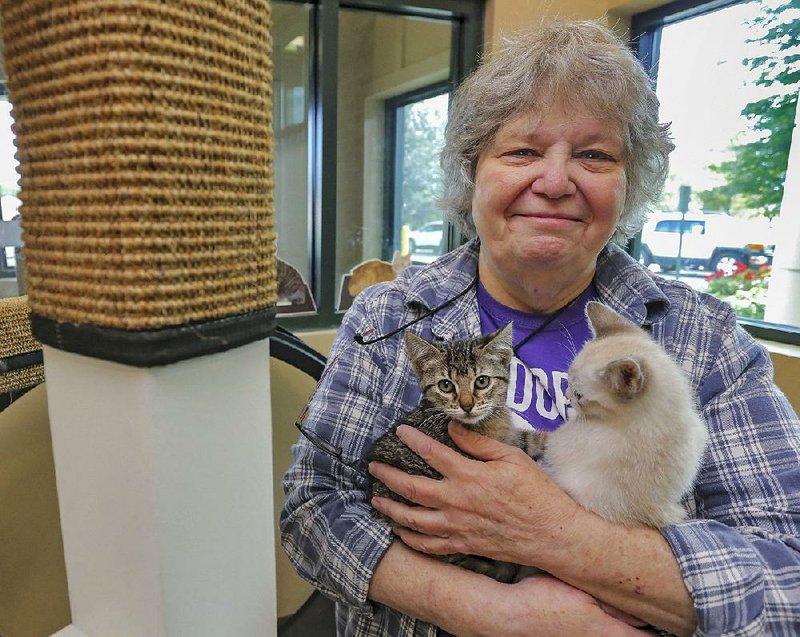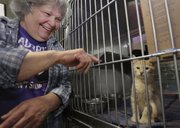Debbie Heller just wanted to pet the cats.
Having recently resigned from two volunteer positions elsewhere, that was all that was on her mind when she walked into the Little Rock Animal Village. The man at the front desk asked her if she wanted to volunteer.
"I had no intention," she says. "I must have been in a really good mood because I said, 'Sure.'"
Except for her four years of college, Heller has owned cats continuously since she was 3 years old. So, it was a bit of a shock when the man informed her she'd have to take training.
"I thought, 'You are going to teach me how to pet cats? You must be kidding me.'"
She took the class -- which ended up being more about the shelter and its policies and programs than about petting cats -- and quickly became a fixture. Now, 8 1/2 years later, she coordinates the shelter's cat programs and has been a key player in a major turnaround in cat adoptions.
"When I started, one out of five cats made it out of here alive," she says. "Now four out of five do. Our manager likes cats and is behind me in every aspect. It's made it very gratifying to see that happen."
Much of the success is due to the many programs designed to help cats survive and find permanent homes, programs in which Heller is closely involved.
Heller says many shelter cat deaths are actually kittens, too small and fragile to be adopted or to survive without their mother. During the nine-month kitten season, it's a steady stream of kittens being born or brought in by well-meaning citizens. Some of those citizens end up adopting one or two of those kittens once they've been weaned. In the meantime, though, kittens take up space, time and energy, all of which are in short supply.
"In a lot of shelters, underage kittens are put down immediately. We don't do that."
Instead, the shelter has an active foster program with about 30 homes ready to take in kittens -- and sometimes their mothers. The foster families stay constantly busy for kitten season, caring for the kittens until they're old enough to be adopted, at which point they're returned to the shelter.
Some of the kittens have to be bottle-fed and Heller says she and one other foster parent are the only bottle-feeding homes she currently has. She's always in need of more.
Another vulnerable type of cat is the wild, feral kind.
"Feral cats had no chance here," Heller says. "There's no way they could be adopted out."
But there are people who struggle to control rats and other pests around their barns, warehouses and sheds. Cats make natural predators.
So, the animal village started its Barn Cat Program in 2016, offering free adoptions of feral cats, all spayed or neutered, microchipped and vaccinated to be outdoor working pets. In the last year and a half, Heller estimates almost 200 feral cats have gone to permanent homes under the program.
"This is a win-win situation."
Another relatively new program is the cat transport sponsored by the ASPCA. Since 2010, some of the shelter's dogs have been sent to Michigan and Wisconsin where there's more shelter capacity and higher adoption demand. Last year, the ASPCA decided to add a cat transport. But, since cats aren't very good travelers, they don't go quite as far. Instead, they're sent to Dallas and Kansas City, Mo.
"That's helped enormously because we have [only] so many cages," Heller says. She estimates they take in about 1,250 cats a year.
Since the shelter itself doesn't get a lot of foot traffic, it has cat cages at PetSmart and Petco where people can see and meet adoptable cats easily. Heller says that accounts for about one third of the cat adoptions. Volunteers routinely prepare paperwork and transport cats to the stores.
Volunteers such as Heller also offer help and advice to prospective adoptive families, many of whom have never owned cats before.
"I always say, cats are not small dogs. They're very different."
They're also working on some new programs like a kitten yoga class and a book buddies activity where children can come in and read children's books to cats.
Joey's Playroom, funded by donations in memory of KTHV's Joey the Garden Cat, opened recently, an open room where cats and kittens can roam and play freely.
But the biggest help, Heller says, is the Internet, where they post photos and profiles of adoptable cats and kittens.
Heller, who is a Realtor "on the side," says, "If people buy houses over the Web, they're sure as heck going to look for cats and dogs over the Internet."
The Little Rock Animal Village is always in need of help: kitten formula, canned food, toys, blankets, monetary donations.
But they especially need more volunteers, particularly in their foster home program. But even people who can't take a cat home can do a lot to help promote cat survival and adoptions.
Cats, Heller explains, don't like change. And when they're taken to the shelter with its strange scents and people and noises, "They're scared to death. The best way to calm them down is to pet them, hold them, give them treats, take them to a quiet area to assure them that the world is not coming to an end."
When some cats first come to the shelter they are aggressive, but with careful attention from volunteers, most calm down and are quickly snapped up by a new family.
"That's totally due to the volunteers who come in and work with them."
And there's always room for one more.
"If you love cats, we will find a way for you to help."
For more information, call (501) 376-3067 or (501) 725-0250 or visit friendsoftheanimalvillage.org.
High Profile on 11/11/2018


